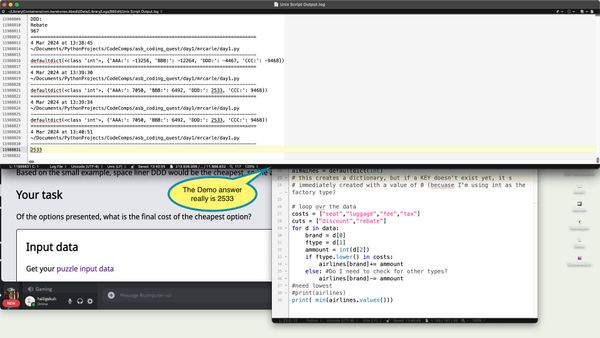Coding Quest started today. This is Paul Baumgarten's amazing, inspiring contribution to global CS education. It's novice Advent of Code, with all the headaches that implies. This is the third full CQ cycle: 10 days of puzzle problems, aimed at HS CS students.
I love Coding Quest, and have been stealth planning my year around it. This is the point where the 11th graders should be able to find the joy in Coding Quest and this style of problem. When I try to express that, I feel [Swansion bacon and eggs] because I know that sounds a lot like a "you must know THESE THINGS" deadline. Those deadlines lead to vast hunts for the teacher's password, trying to figure out the right things to know. Those deadlines are in an equivalence class with tests
That's not how to approach these puzzles. Puzzles are obstacle courses, tough mudder runs or any of those other for some value of "enjoyable" Imposition of Uneccesary Obstacles
Each year I hope that students come and stop by during the lynx/lunch block in Bingle's room. In past year's that's been the introduction to what it feels like to think through problems together. It's the best (only?) place I've found to demonstrate/perform the observational and model building science part of coding. Read the error. Look at that line number. Read those words. Do you know what they mean? Can you think of a way to test that?
One of the biggest ToK / epistemological hurdles of CS is that there is ground truth. Better yet, there's often a repo. The legible, comprehensible old internet was built to and by expos(ing) the full Chain of Thought and blueprints for the entire edifice. Back to the compiler. Back to the RFC.
I admire Paul's work on Coding Quest for providing the obstacle course where we can model how to think through new ideas, together.
I've been trying out 1hz screenshot recordings, just looking for a reason. Stealing a old First Act idea: How about this as a mid-shot free throw?

Is this code that successfully processed the demo data going to get the right result on the full puzzle?
Make a guess. Just make it. Yes or no?
Dan's insight was that lowering the floor on that first ask created engagement, created expectations and disappointments and Papert's moment of disrupted models where we notice that we are confused
I am wrong and confused frequently. Come hang out at lynx & lunch. We'll practice getting better.